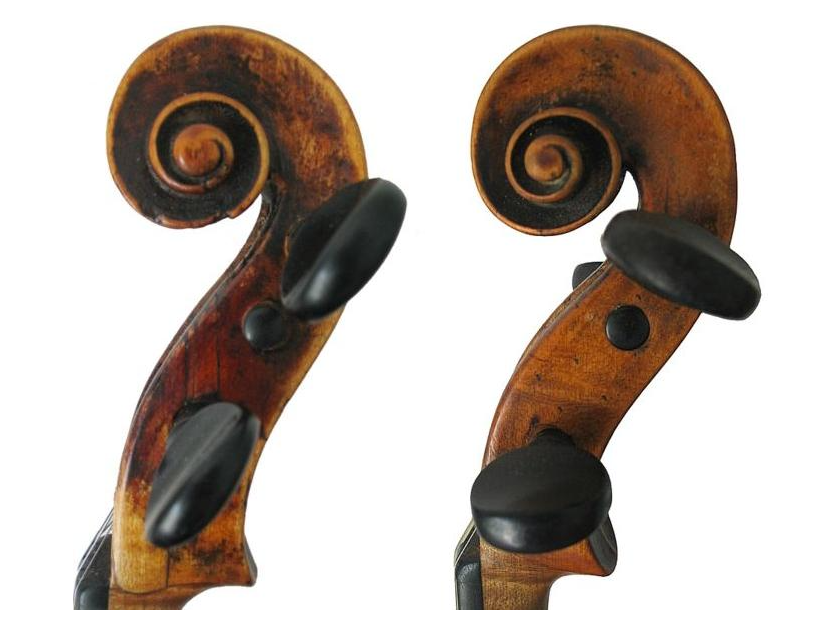
Violin scrolls
I began a writer’s life when my daughters were born deaf.
I believed at first that my writing was a way to process new motherhood, with the layers that raising deaf children (as a hearing parent) add: how will we communicate? how will we be close?
I wrote out my longing for intimacy with my daughters; my fear that a gulf between sound and silence would keep us apart. I wrote about the decisions we made, opting for hearing technology and spoken language training, and our hopes that our daughters would flourish as a result.
When we learned that our daughters’ deafness was genetic, I researched my family tree and found deaf ancestors. I discovered — and this was perhaps the most important thing — that the deaf women in our family, when they became new mothers, tied strings to their babies in the night, so that when the babies cried, they’d feel the tug and wake to care for them.
It took me years to realize that my daughters’ deafness would help me work through feelings I myself had as a child: feelings of being unheard by my mother. My initial worry about whether my children would hear got turned on its head: my deeper worry was whether I would hear them. The innovations of the deaf mothers in my ancestry heartened me and informed my parenting, but a longing (from my own childhood) remained.
My initial worry about whether my children would hear got turned on its head: my deeper worry was whether I would hear them
When I wrote a memoir about deafness in my family, it was in part a story of understanding my mother’s hearing problems (which were figurative as well as literal), and of reconciling myself to the ways she couldn’t attend to me. Many families are worse for the wear after a memoir is written, but my relationship with my mother improved. The writing of it brought me to a place of compassion for her circumstances, and the reading of it helped her recognize my feelings.
During a book event for my memoir, at which I described our daughters’ “hearing lessons” and our efforts to encourage them to vocalize, I met a hidden child of the Holocaust, who described her childhood experience, hiding in a barn attic with her mother. She’d had to stay entirely still and silent as her mother sought to make her vanish beneath hay. As I thought about this child and her mother, a new writing project — with many familiar threads — emerged.
The novel that took form is about a musical child, a five year old named Shira, who must stay hidden in wartime Poland with her mother. With music pulsing through her, Shira cups her hands into a nest and conjures a bird who can sing aloud the melodies she hears in her head. To keep them occupied and to pass the time, Shira’s mother, Roza, whispers a story about a brave little girl and her bird, who live in a silent garden and together avert threats and find safety. And so it goes until their hiding place, a farmer’s barn, becomes too dangerous.
I met a hidden child of the Holocaust, who described her childhood experience, hiding in a barn attic with her mother. She’d had to stay entirely still and silent as her mother sought to make her vanish beneath hay.
When Shira is no longer in the barn, she takes up the violin. It becomes her voice, her expression — and her connection to her family. Shira plays to remember the chestnut hues in her mother’s black hair, the crinkled lines around her father’s eyes. She writes musical compositions for violin and cello (her mother’s instrument). Eventually she joins an orchestra and at every performance she scans the audience, hoping that by some chance her mother will be there.
It was only when I finished writing that I understood I’d written out my longing to connect with my father as much as with my mother. Music tied my father to his Jewish roots, and music tied me to him. As a child, I listened to his nightly violin practice; often I warmed up my voice (I was a vocal student) and sang along. We shared this, even when we didn’t share much else. It’s no surprise to me (now) that Shira sought connection to her parents with every bow stroke, the call for a string, wrist to wrist.
I completed the novel last year, just months before my father’s death. Because of a protracted illness he couldn’t read, and he lacked the attention span to listen to an audiobook, so he never learned the full contents of my manuscript.
One thing I was able to convey to my father before he died was that I dedicated the novel to him and to my mother. And I was able to sing to him. As I did, I longed for the notes of his violin, his accompaniment.
Jennifer Rosner is author of The Yellow Bird Sings, a 2020 National Jewish Book Award finalist in Debut Fiction and Book Club. She also wrote the memoir If a Tree Falls: A Family’s Quest to Hear and be Heard, and the picture book, The Mitten String, about deafness in her family, which she has traced back to Galicia in the 1800s.